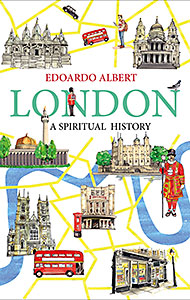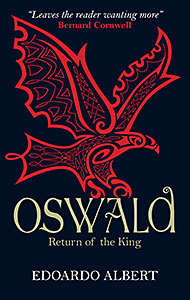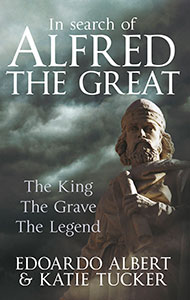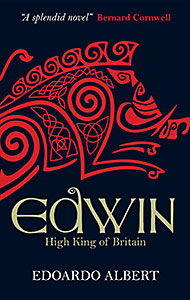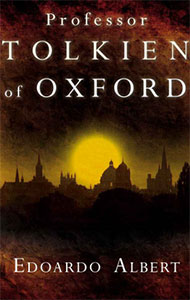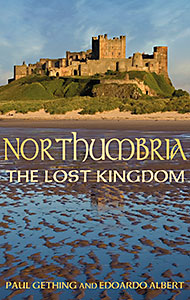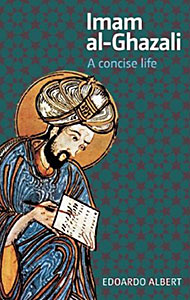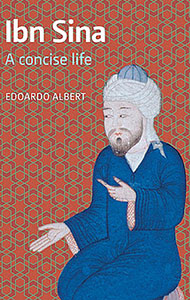Edwin, the deposed king of Northumbria, seeks refuge at the court of King Raedwald of East Anglia. But Raedwald is urged to kill his guest by Aethelfrith, Edwin’s usurper. As Edwin walks by the shore, alone and at bay, he is confronted by a mysterious figure – the missionary Paulinus – who prophesies that he will become High King of Britain. It is a turning point. Through battles and astute political alliances Edwin rises to great power, in the process marrying the Kentish princess Aethelburh. As part of the marriage contract the princess is allowed to retain her Christian faith. But, in these times, to be a king is not a recipe for a long life …This turbulent and tormented period in British history sees the conversion of the Anglo-Saxon settlers who have forced their way on to British shores over previous centuries, arriving first to pillage, then to farm and trade – and to come to terms with the faith of the Celtic tribes they have driven out.
Here’s what Bernard Cornwell said about the book: “Edwin, High King of Britain, brings to life the heroic age of our distant past, a splendid novel that leaves the reader wanting more.” (Yes, that Bernard Cornwell!)
First Published 21st March 2014 by Lion Fiction.
Excerpt
“My lord.”
Edwin stood, sliding up from his crouch as smoothly as a
cat. The seax glittered in the star light.
“What do you want of me?”
“I know well why you stand outside the king’s hall through
the dark of the night.” The man’s voice was deep and strong, with the resonance
of a scop, but his words carried a strange accent, unlike any Edwin had heard
before.
“Who are you?”
“I know why you stand vigil by the sea, through the darkest
watches of the night, alone and troubled in mind, my lord. I know the evil that
threatens you, the betrayer who will hand you over to your enemies and I ask
you this: what reward would you give the man who can save you from evil? What
would you do for the man who persuades King Rædwald to remain in his honour and
not hand you over to your enemies?” As the man spoke, his voice grew lower,
quieter, but Edwin could still hear it clearly, for all other sound had faded
from the world.
“What reward would you give that man?”
Edwin – a tall man – looked up into the face of his
questioner. “For such a deliverance, I would give whatever was in my power to
give.”
The dark man grasped his staff, planting it more firmly in
the ground, but he made no move to approach closer.
“And what if that man prophesied, and prophesied in truth,
that you would become king, putting down your enemies in their pride? And that
you would ascend to a greater power than any of your fathers, a greater power
than any king in these islands has wielded since the days of the Emperors?”
Edwin could not tear his gaze from the shadowed eyes of the
cloaked man. Who was he? Was he a god?
“If such things came to pass, I would give more generously
than any king – gold, and jewels, and horses.”
The stranger inclined his head. “And if this man unknown to
you, who spoke in truth revealing the paths of the future and the glory that
awaits, also brought guidance for life and salvation, knowledge unrevealed to
your fathers and forefathers, would you follow his counsel and obey his
advice?”
Edwin fell silent. The stranger waited for his answer.
“If such a man exists, who by his counsel can deliver me
from my enemies and raise me to the throne, then assuredly I would follow his
advice and wait upon his counsel.”
The cloaked man bowed his head. His lips moved, and Edwin
heard the murmur of words in a language unknown to him. Then he raised his head
and stepped towards the king. Placing his hand upon Edwin’s head, he said,
“Remember this. Remember well this sign I place upon your head. When you
receive this sign again, remember this conversation and remember your promise.”
The cloaked man stepped back and raised his cowl to cover
his head.
“Who are you?” asked Edwin. “Are you a god?”
The man, his face now lost again in shadow, turned away.
“Remember the sign,” he said and walked into the shadows.
Not daring to move, Edwin watched as the stranger merged
into the night. Woden, the All-Father, wore a hood when he wandered the world.
Edwin shivered. It was late summer and the night was not cold, but he shivered,
in awe, and fear, and, most dreadful of all, in hope.
